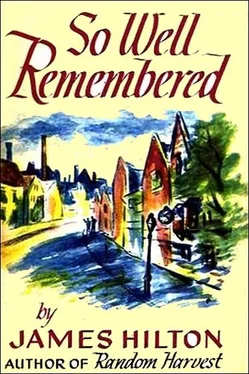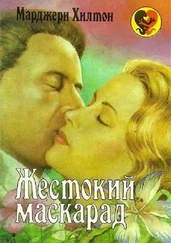Джеймс Хилтон - So Well Remembered
Здесь есть возможность читать онлайн «Джеймс Хилтон - So Well Remembered» весь текст электронной книги совершенно бесплатно (целиком полную версию без сокращений). В некоторых случаях можно слушать аудио, скачать через торрент в формате fb2 и присутствует краткое содержание. Год выпуска: 1945, Жанр: Проза, на английском языке. Описание произведения, (предисловие) а так же отзывы посетителей доступны на портале библиотеки ЛибКат.
- Название:So Well Remembered
- Автор:
- Жанр:
- Год:1945
- ISBN:нет данных
- Рейтинг книги:5 / 5. Голосов: 1
-
Избранное:Добавить в избранное
- Отзывы:
-
Ваша оценка:
- 100
- 1
- 2
- 3
- 4
- 5
So Well Remembered: краткое содержание, описание и аннотация
Предлагаем к чтению аннотацию, описание, краткое содержание или предисловие (зависит от того, что написал сам автор книги «So Well Remembered»). Если вы не нашли необходимую информацию о книге — напишите в комментариях, мы постараемся отыскать её.
So Well Remembered — читать онлайн бесплатно полную книгу (весь текст) целиком
Ниже представлен текст книги, разбитый по страницам. Система сохранения места последней прочитанной страницы, позволяет с удобством читать онлайн бесплатно книгу «So Well Remembered», без необходимости каждый раз заново искать на чём Вы остановились. Поставьте закладку, и сможете в любой момент перейти на страницу, на которой закончили чтение.
Интервал:
Закладка:
She looked at the paper then. It was a small paragraph on an inside page, reporting that Mrs. John Channing had been killed instantly when the car she was driving overturned on the road between Chartres and Orleans, and that a Mr. Standon, who was a passenger, had been severely injured. The reading public was further reminded that Mrs. John Channing was the wife of the same John Channing who, etc. etc.
Livia did not speak. She read the paragraph over and over, trying to grasp not only what it meant, but what it signified in her own life; and then, because of the tears in Martin’s eyes, she began to weep herself. “Oh, mother… MOTHER…” she sobbed. But even while she did so a thought came to her in such a guise that she felt dreadful for having the kind of mind in which it could even exist—the thought that in his distress, which was also hers, Martin might now want her to stay at Stoneclough for company’s sake. Yet how could one help one’s thoughts, whatever they were? And she WAS distressed; her tears, imitative at first, were perfectly genuine as they proceeded. But she knew now, for certain, how much she wanted not to leave Stoneclough, and that all the excitement of packing to go abroad would be nothing to the quiet relief, even the sad relief, of unpacking.
But it was not to be. As soon as she hinted at it, he said no; if the news had upset her very much she could postpone departure for a day or two, but that was all; and really, he thought it best for her to go; the change of scene and new companions would prove a great help, he assured her.
“And it wouldn’t help YOU, Martin, if I stayed?”
He half smiled. “That’s very kind of you, my dear, but I really don’t think it would.”
After that she was proud enough to leave that night, as had been planned, and not accept the short delay that was so pitiable a substitute for what she had hoped.
But she was not long away from Stoneclough. The time was April, 1914; she had one term at the Geneva school, then returned to England for the summer holidays just before war broke out. And when the next term began, in September, the Germans were on the Marne and it was thought inadvisable to send English girls across France, even to the best Swiss finishing-schools.
One day, to escape a heavy shower, Livia entered the Browdley Public Library, and by sheer chance as she wandered in and out of the alcoves, came upon a section dealing with law cases and jurisprudence; one of the books, conspicuous by its worn condition, proved to be a verbatim report of the Channing case. The name was a shock that set her heart beating, but a greater one came when she opened the book and found, against the title-page, a photograph of her father as he had been at the time of the trial all those years before. So young, so handsome, so dashing; she could hardly believe it was the same man… and against the photograph, scrawled in pencil, was a word unknown to her, but which she guessed to be foul. It brought a flush to her face that she thought everyone in the library must notice, but no one did, and with a curious hypnotized fascination she took the book to a secluded table and began to read carefully. Later, when she had to leave, she hid it behind some other books, so that nobody should borrow it before she continued reading the next day. Not being a library member she could not borrow it herself, nor did she want to order a copy from a bookseller. But every afternoon for a week she spent an hour or two in the library alcove, trying to understand the crime that her father had committed. And for the most part she was mystified. It was all to do with another world—a world of complicated details and strange jargon—false estimates of reserves, duplicated stock certificates, and so on. What puzzled her was the intention behind it all, and to this she found no positive clue until she came to the defending counsel’s speech, in which her father was portrayed as a brilliant visionary who had wished to amalgamate a large group of cotton mills with a view to preventing their eventual bankruptcies as separate competitors. But then, when she came to the judge’s summing-up, the whole picture was different—that of an ambitious, unscrupulous adventurer, greedy for power, employing deliberate deceit to tempt unwary investors… The two pictures made the problem harder than ever, the more so as neither bore the slightest resemblance to the man she herself knew. She then re-read the examinations and cross-examinations, seeking to disentangle some corroboration of one or other viewpoint out of the mass of opposite and bewildering evidence. The main thing she gathered was that her father had once been in a position to deal with vast sums of money, whereas now he could hardly afford the extra hundred pounds by which the taxes on Stoneclough had lately been increased.
Some day, she thought, he would tell her all about it; and then he would be surprised to find out how much she knew already. But what DID she know? The chief clue was missing… WHY had he done whatever it was that he had done? Not only why had he defrauded people, for that question had already been given two conflicting answers, but why had he been either the adventurer greedy for power, or the visionary with dreams of reorganizing an industry? Why? For it had been stated over and over again during the trial, as if it were against him, that the Channing Mill itself was sound until his own course of action ruined it; everything would have been all right, therefore, if he had let things alone. Only he hadn’t let things alone.
And then, too, she realized with a sense of discovery, though it was obvious by simple arithmetic, that he had spent many years in the industrial and financial world before the crash. His career was referred to at the trial as having been an ‘honourable’ one; distinguished connections were cited with a number of companies besides his own. Why, then, had he suddenly broken whatever were the rules of the game?
There was yet a third character-reading, scattered throughout the book in sundry pencilled remarks. “Liar”, “Thief”, “Swindler”, were among the mildest of them; but on the last page was a clue, if not to her father’s motives, at any rate to his anonymous accuser’s. For in the margin alongside the judge’s pronouncement of sentence was the scribbled comment: “And not half what the —deserved for ruining me and hundreds more.”
Long after she had finished the book and had learned all she could from it she found that even passing the library gave her an itch of curiosity— was it still being read, was some other unknown borrower adding new pencilled insults to the printed lines? She would sometimes dash into the building just to see, and one day she reflected how simple it would be to put the book under her coat and take it away as she walked out. But she could not make up her mind to do this. It was no question of the morals of stealing, or of risk in being discovered, but rather of her personal attitude towards Browdley: to remove the book would somehow be accepting defeat, whereas to leave it was —if not victory—at least a challenge and a defiance. So she left it, and the library took on a curious significance in her mind: the place where the book was, and where people went who hated Martin.
He never spoke to her about the past, or gave her any opening to ask him direct questions about it; but sometimes, apropos of other things, he made remarks that connected themselves with it in her mind—remarks that did not so much reveal the light as illumine the darkness. Once he said: “The hardest thing in the world is to understand how you were once interested in something that no longer interests you at all.” And another time, standing with her in the garden on one of those rare clear days when all Browdley could be seen in the distance, he said: “The factories look big, don’t they? They dominate the town like the cathedrals at Cologne or Amiens… perhaps they ARE cathedrals, in a way, if enough people believe in them.” And then he mentioned a lecture by a young fellow named Boswell who was trying to get on the Browdley Council—a lecture Richard Felsby had told him about in great indignation because it had blamed the Channing and Felsby families for much that was wrong about the state of Browdley. “There’s some truth in it, though. Whenever I think of those rows and rows of drab streets huddling under the cathedrals I have the feeling that if somebody were to send me to jail for THAT, I’d consider it a just sentence… We’re all guilty, Livia, of everything that happens. Read the papers and see how.” (It was the autumn of 1917, the blackest time of the war.) “And if guilt had to be paid for by punishment, then the earth would be one vast prison. Perhaps that’s what it is.”
Читать дальшеИнтервал:
Закладка:
Похожие книги на «So Well Remembered»
Представляем Вашему вниманию похожие книги на «So Well Remembered» списком для выбора. Мы отобрали схожую по названию и смыслу литературу в надежде предоставить читателям больше вариантов отыскать новые, интересные, ещё непрочитанные произведения.
Обсуждение, отзывы о книге «So Well Remembered» и просто собственные мнения читателей. Оставьте ваши комментарии, напишите, что Вы думаете о произведении, его смысле или главных героях. Укажите что конкретно понравилось, а что нет, и почему Вы так считаете.










